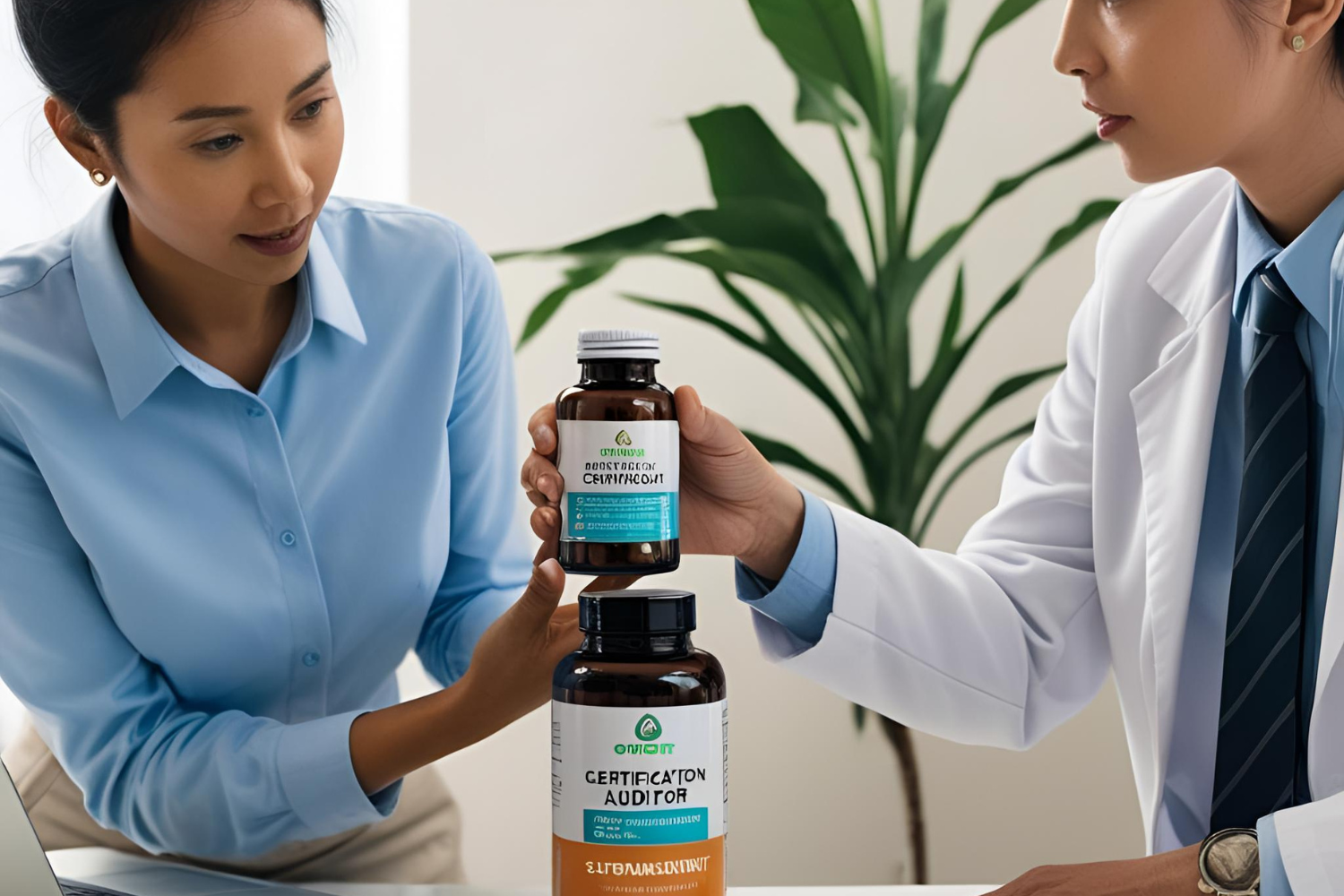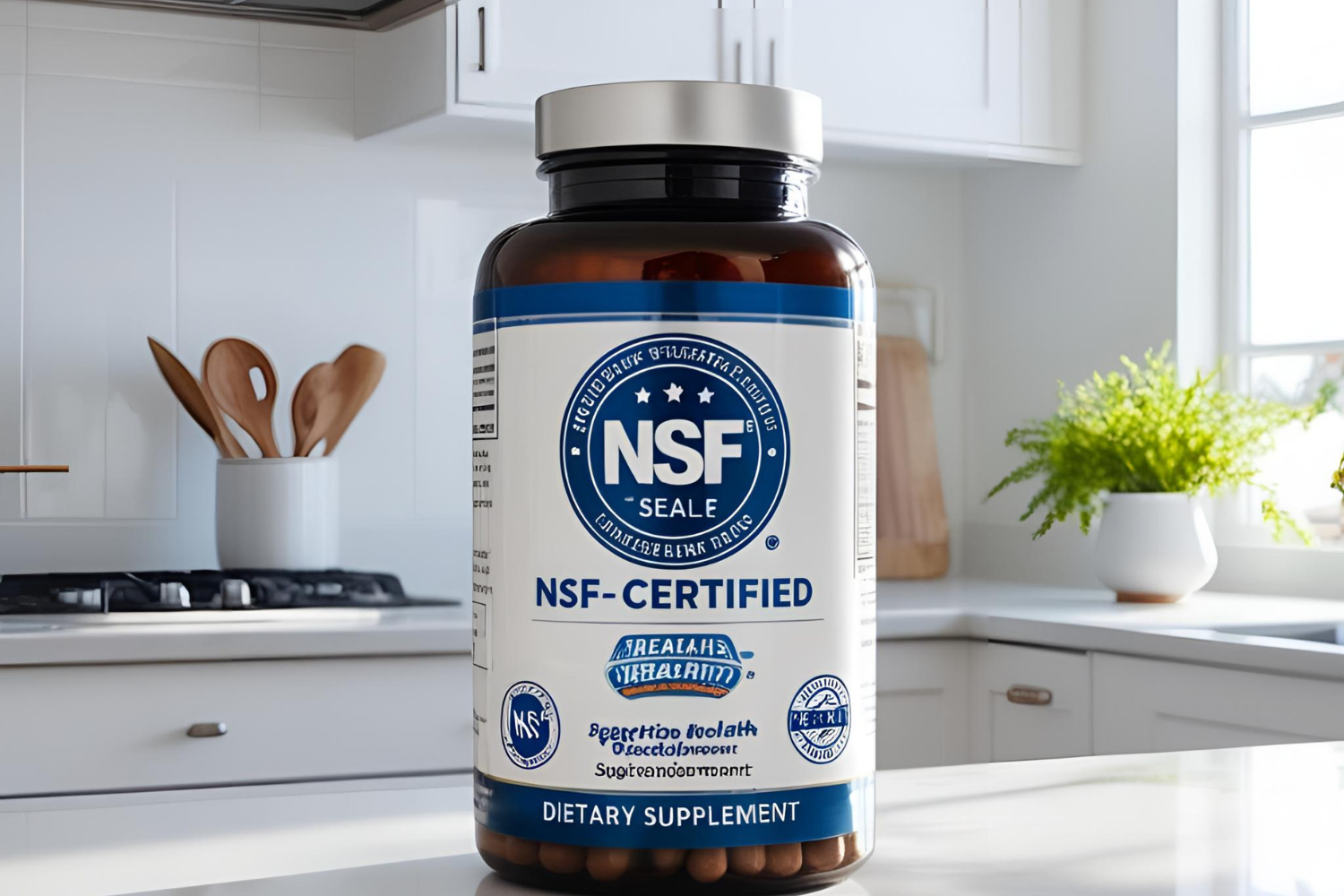Certifications are crucial in the supplement industry, ensuring products meet strict safety and quality standards. NSF Certification, issued by NSF International (formerly the National Sanitation Foundation), is a widely recognized third-party certification that verifies dietary supplements, functional foods, and personal care products for compliance with ingredient accuracy, contaminant testing, and industry standards.
This certification helps companies demonstrate their commitment to public health and product integrity. This article examines NSF certification, its benefits, and how it compares to FDA and GMP standards to help supplement brand owners determine if it aligns with their business goals.
Table of Contents
ToggleWhat is NSF Certification?
NSF Certification is a third-party verification issued by NSF International, an independent organization dedicated to protecting public health. It ensures that dietary supplements, functional foods, and personal care products meet strict safety standards. NSF evaluates products through testing, facility inspections, and label verification to confirm compliance with regulatory and industry requirements. Brands that earn the NSF mark demonstrate their commitment to quality and consumer safety.
Core Standards of NSF Certification
- Product Testing: NSF evaluates dietary supplements and consumer products to verify ingredient accuracy and ensure they are free from harmful contaminants.
- Facility Inspections: Manufacturing sites undergo regular audits to confirm compliance with sanitation, quality control, and food processing regulations.
- Label Accuracy: NSF certifies that product labels accurately reflect the ingredients and dosages inside, preventing misrepresentation.
- Good Manufacturing Practices (GMP): NSF certification includes product testing, facility inspections, and verification of label accuracy to ensure compliance with established standards.
- Contaminant and Allergen Screening: Products are reviewed for banned substances, heavy metals, and other harmful impurities.

Process Overview
Companies seeking NSF certification start with an application and submission of product details. NSF evaluates formulations, labels, and manufacturing processes before scheduling facility inspections. Products undergo laboratory testing to verify ingredient accuracy and safety. If all certification criteria are met, NSF certifies the product, allowing the company to use the NSF mark. Ongoing testing and facility audits ensure continued compliance with NSF standards.
Key Benefits of NSF Certification for Supplement Brands
NSF certification offers supplement brands a competitive edge by verifying product safety, quality, and compliance with industry regulations. It helps businesses meet strict standards, gain retailer acceptance, and build consumer confidence.
Benefits of NSF Certification
- Consumer Trust: The NSF mark assures customers that certified products have undergone independent testing for ingredient accuracy, purity, and compliance with NSF standards.
- Retail Acceptance: Many major retailers require or prefer NSF-certified supplements, making it easier for brands to enter new markets.
- Compliance and Transparency: NSF evaluates ingredient lists, verifies formulations, and tests for contaminants to ensure regulatory compliance.
- Marketing Advantage: Certification helps brands differentiate themselves by highlighting their commitment to quality, safety, and public health.

How NSF Certification Compares to GMP and FDA Compliance
NSF certification, GMP (Good Manufacturing Practice), and FDA compliance each play a role in ensuring supplement safety, but they serve different purposes. Understanding these differences helps brands determine which certifications align with their business needs.
GMP Certification
GMP certification focuses on manufacturing processes, ensuring consistency in production, sanitation, and quality control. It establishes strict standards for facility operations, employee training, and ingredient handling to prevent contamination and ensure product integrity.
Unlike NSF certification, which involves third-party testing and ingredient verification, GMP primarily regulates how supplements are manufactured. While both certifications support product quality, NSF evaluates final products for safety, while GMP ensures the manufacturing process follows industry guidelines.
FDA Compliance
The U.S. Food and Drug Administration (FDA) regulates dietary supplements by overseeing ingredient safety and labeling requirements. However, the FDA does not approve supplements before they reach the market or require third-party testing. Instead, it monitors compliance with safety and labeling laws and takes action against unsafe products.
NSF certification provides independent verification of ingredient accuracy, contaminant screening, and label compliance, offering an additional layer of oversight beyond regulatory requirements. While FDA compliance ensures legal adherence, NSF provides an additional level of assurance through independent evaluation and ongoing testing.
Consumer Perception Comparison
Consumers often view NSF certification as a mark of trust because it involves independent testing and strict standards. GMP certification reassures buyers that supplements are manufactured under controlled conditions, but it does not test finished products. FDA compliance is expected for all supplements, but since it does not require third-party verification, many consumers and retailers prefer NSF-certified products for an extra layer of confidence.

Pros and Cons of NSF Certification for Supplement Brands
NSF certification offers key advantages but also presents challenges depending on a brand’s goals, budget, and market positioning.
Pros
NSF certification strengthens a brand’s credibility and ensures compliance with industry standards. It enhances trust with consumers, retailers, and regulatory bodies.
- Builds a strong reputation with consumers and retailers.
- Can reduce liability by demonstrating adherence to industry standards.
- Differentiates products in a crowded market with high standards of quality and purity.
Cons
Despite its benefits, NSF certification requires financial and operational commitments that may not be necessary for all brands.
- Cost of certification can be high, especially for smaller brands.
- Requires regular testing and inspections, which can add time to the production process.
- May not be essential for every brand, depending on target market and retailer requirements.

Steps to Obtain NSF Certification
Earning NSF certification involves a structured process to ensure supplements meet strict safety and quality standards. Each step verifies compliance with NSF’s mission to protect public health through rigorous testing and auditing.
Determine Eligibility
Before applying, brands must confirm that their products and manufacturing facilities meet NSF’s basic certification criteria. NSF evaluates dietary supplements, functional foods, and personal care products based on ingredient purity, label accuracy, and adherence to food safety standards. Companies must also follow Good Manufacturing Practices (GMP) and use compliant food processing and sanitation procedures.

Application Process
The certification process begins with submitting an application that includes product formulations, ingredient sources, and manufacturing details. Companies must provide supporting documentation such as facility procedures, quality control records, and safety data. NSF International reviews the information and outlines the required testing and auditing steps. Application fees vary based on product complexity and facility size.
Testing and Auditing
NSF evaluates submitted products through laboratory testing to verify ingredient accuracy, ensure compliance with NSF standards, and check for contaminants. Manufacturing facilities undergo on-site inspections where NSF reviews sanitation practices, equipment maintenance, and compliance with strict standards. Any issues identified during testing or audits must be resolved before approval.
Final Approval and Certification Maintenance
Once all certification criteria are met, NSF grants certification, allowing the brand to display the NSF mark, indicating compliance with NSF standards. Brands must maintain certification through annual audits, ongoing product testing, and compliance reviews. If any changes are made to formulations or manufacturing processes, NSF must review and approve them to ensure continued compliance.

Is NSF Certification Right for Your Brand? Key Considerations
NSF certification provides valuable benefits, but brands must assess whether it aligns with their business goals, target market, and budget before committing to the process.
Target Market
Brands catering to health-conscious consumers, athletes, or professionals in regulated industries may benefit from NSF certification. Many consumers seek third-party certified products to ensure compliance with industry standards, particularly in the sports supplements and functional foods categories.
Retailer Requirements
Many large retailers prefer or require NSF-certified products, including health food stores, gyms, and supplement chains. Meeting these standards can open doors to new distribution opportunities and increase a brand’s competitiveness in the marketplace.
Brand Positioning
NSF certification enhances credibility for brands that market themselves as premium, high-quality, or dedicated to consumer safety. Having the NSF mark on packaging signals commitment to product integrity, which can differentiate a company in a crowded market.
Budget and Resources
The certification process requires financial investment for testing, facility inspections, and ongoing compliance reviews. Brands must evaluate whether the costs and resources needed align with their long-term business strategy and potential return on investment.

Is NSF Certification a Smart Investment for Supplement Brands?
NSF certification strengthens a supplement brand’s reputation by verifying compliance with established quality and testing standards. It provides third-party verification to increase consumer trust and open opportunities with major retailers.
Brands should evaluate their market position, budget, and long-term goals before pursuing certification. For companies focused on transparency and compliance, NSF certification can be a valuable investment that sets them apart in a competitive industry.
Frequently Asked Questions
What is the difference between NSF certification and FDA approval?
NSF certification involves independent testing and verification of product safety, while FDA approval regulates supplement ingredients and labeling but does not require third-party testing.
How long does it take to get NSF certified?
The process typically takes several months, depending on product complexity, testing requirements, and facility inspections.
Is NSF certification required to sell supplements in major retail stores?
While not always mandatory, many retailers prefer or require NSF-certified products to ensure safety and compliance with strict standards.
What are the costs associated with NSF certification?
Costs vary based on product type, facility size, testing needs, and annual audits, making it important for brands to budget accordingly.
Can NSF certification help with international market expansion?
Yes, NSF certification enhances credibility and meets global safety standards, making it easier to enter international markets that require third-party verification.
References
- National Institutes of Health (NIH). (1994). Dietary Supplement Health and Education Act of 1994. https://ods.od.nih.gov/About/DSHEA_Wording.aspx
- National Institute of Standards and Technology (NIST). (n.d.). National Voluntary Laboratory Accreditation Program (NVLAP). https://www.nist.gov/nvlap
- U.S. Department of Agriculture (USDA). (n.d.). National Organic Program. https://www.ams.usda.gov/about-ams/programs-offices/national-organic-program
- U.S. Food and Drug Administration (FDA). (2025). Current Good Manufacturing Practice (CGMP) Regulations. https://www.fda.gov/drugs/pharmaceutical-quality-resources/current-good-manufacturing-practice-cgmp-regulations
- U.S. Food and Drug Administration (FDA). (2024). Current Good Manufacturing Practices (CGMPs) for Food and Dietary Supplements. https://www.fda.gov/food/guidance-regulation-food-and-dietary-supplements/current-good-manufacturing-practices-cgmps-food-and-dietary-supplements




